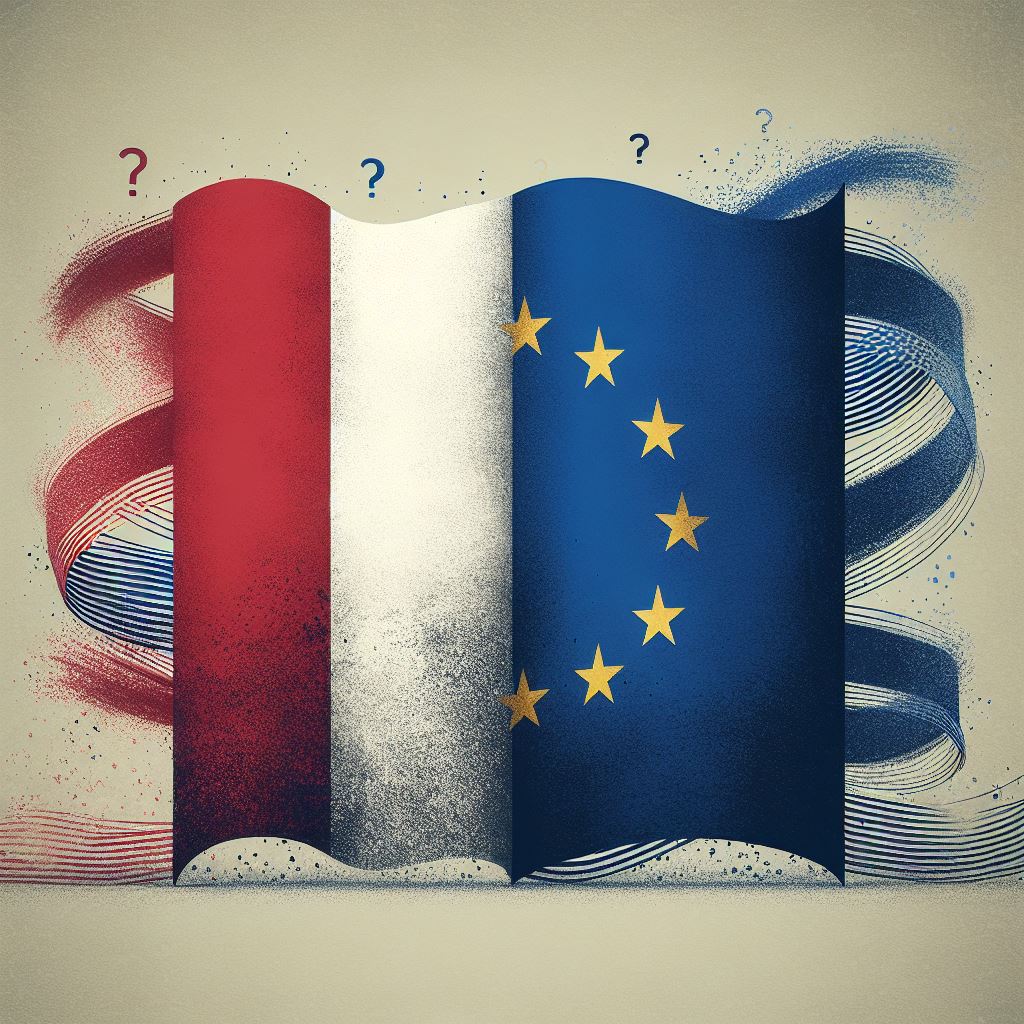[FR] French-style euroscepticism
Between mistrust and ambivalence

1. The French attitude towards the EU: ambivalent relations and strong Euroscepticism
France is one of the countries whose inhabitants are least favourable towards the EU.
However, although the French attitude towards Europe is marked by gloom and mistrust, we should not jump to conclusions about widespread, unqualified Euroscepticism among the French.
It is necessary to analyse in detail the complexity of the French attitude towards the EU.
To do this, it is important to distinguish between two types of ‘ political support ’: ‘ diffuse support ’ (the most abstract feelings and attitudes: adherence to a vision, values, etc.) and ‘specific support’ (assessment of the effectiveness of actions taken at EU level). Based on this distinction, it is possible to identify an initial characteristic of the French people’s ambivalent relationship with Europe: support for the EU is higher when expressed at the most diffuse level (while 56% of French people are attached to Europe, 51% of French people believe that the European Union is ‘distant’ and 56% think that it is not ‘effective’, compared with 47% of citizens in the Member States as a whole). By focusing on citizens’ assessments of Europe’s actions, a comparative analysis makes it possible to define France’s position in terms of support for the European Union compared with that of other Member States.
It outlines a geography and a typology of opinions towards the EU which highlight the following elements:
- A first divide at European level distinguishes between countries that are most favourable to European integration and those that are least favourable. The French are among the most negative Europeans towards the EU. The first group includes (in descending order of support for the EU) Ireland, Portugal, Malta, Poland, Croatia, Denmark and Hungary; the second group (in descending order of opposition to Europe) includes Greece, France, Finland, Latvia, Cyprus, the Netherlands and the Czech Republic.
- A social divide is a second significant dividing line for all countries, and particularly for European integration is viewed negatively by the working classes, manual workers, the unemployed and those who left education before the age of 16. Belonging to the most disadvantaged social groups largely corresponds to a perception of Europe as a threat to national social protections.
- A typology distinguishes four groups of attitudes towards the EU, based on their positioning and its intensity. The French are divided as follows: 32% belong to the first group (positive), 35% to the second group (negative), 16% to the third group (somewhat positive) and 17% to the last group (somewhat negative). Forty-eight per cent of French people have positive opinions, compared with 68% of
2. Very strong but complex Euroscepticism, far from being systematic
Although France ranks among the countries where Eurosceptic views are most widespread, the French can also be supportive of Europe on certain issues. Indeed, pro-European attitudes can occasionally rally nearly three-quarters of French people. It is therefore important to look beyond the distinction between pro-Europeans to understand why and how French opinion, which is highly critical on many issues, can swing to express predominantly pro-European positions on others.
These shifts are mainly due to individuals who are interested in Europe but express a ‘neutral’ position towards the EU, identifiable through Eurobarometer questions. These ‘ambivalent’ individuals are similar to some aspects of Europhiles and to other aspects of Eurosceptics:
- Similarities with Europhiles: openness to others, strong support for the principles of the EU (84% of ‘ambivalent’ respondents consider the right to work in all Member States to be a good thing) and for common policies (70% of ‘ambivalent’ respondents support European economic and monetary union with a single currency, the euro, and are in favour) and the importance of the EU’s voice in the world (65% of the “ambivalent” recognise this importance).
- Proximity to Eurosceptics: lack of knowledge about the EU is at the root of the shift from support in principle to mistrust (only 29% of the “ambivalent” are fairly confident in the EU, which brings them closer to the Eurosceptics, where this proportion falls to 6%, compared with 67% among those who express an opinion
A lack of understanding of how Europe works is a major factor in the French people ‘s distrust of Europe (France ranks last among the 27 Member States).
Far from being systematic, French Euroscepticism is expressed differently according to more or less complex profiles that vary depending on the issues addressed. Cultural factors are a major factor in explaining the French people’s ambivalent relationship with Europe.
3. How can we explain the ambivalence of the French people’s relationship with ‘Europe’?
The French attitude towards Europe is marked by a national logic of ‘projection’ that explains the ambivalence at the heart of relations between the French and ‘Europe’: either the latter is perceived as an “instrument” serving France, or it acts as a revealer or distorting mirror of the famous ‘French exception’.
From this perspective, several explanatory factors of a cultural nature can be put forward to understand the specific relationship that the French have with the EU:
- A unitary political culture at odds with the European culture of compromise: The unitary conception of sovereignty in France clashes with the pluralist conception of institutional and political practice within the EU. This French representation of political practice has consequences for the understanding of the reality and complexity of political life at the EU level: difficulties in integrating the practice of compromise, in recognising the legitimacy of defending particular interests, and in adapting to the system of variable-geometry majority coalitions.
- A socio-economic culture marked by a certain mistrust or even hostility towards liberalism: negative perceptions of liberalism, free trade and competition have a negative impact on the relationship that many French people have with the market, which is at the heart of the European Union. Thus, for 40% of French people, liberalism is associated with something negative. Similarly, for 23% of French people, free trade evokes something negative (ranking last among the countries studied). Finally, for many French people, competition is considered a negative factor. The Colbertist culture, which is still very strong in France, is at odds with the reality of the European internal market, as shown by the debates in France on industrial policy and the policy of The difficulty in France in accepting the very word liberalism, as well as the French preference for public spending, may also be the ‘hidden face’ of the state-centrism of French political culture. This attitude is also reflected in the singularly high level of hostility towards globalisation in France. The mistrust of the Stability Pact confirms the low importance attached in France to another central figure in the political culture present in public debates in other countries: the taxpayer. Furthermore, the fact that political controversies in France continue to focus on choices (regarding the role of the state, competition, budgetary balance) that have already been decided by treaties accentuates the disconnect and the feeling of an undemocratic straitjacket.
- This logic of national projection finally puts France’s reluctance towards enlargement into perspective. For more than half a century, France has managed to combine two radically different visions of the raison d’être of its European commitment: on the one hand, the project of the ‘founding fathers’ (convergence of the interests of the Member States) and, on the other, the Gaullist project of a Europe as an instrument enabling France to promote its national interests. The enlargements to include the countries of Central and Eastern Europe forced France to clarify its European project, as the French discovered that ‘Europe is not just France on a larger scale’! This is undoubtedly the main reason for the nostalgic discourse, particularly in France, about a ‘small Europe’ and the difficulty of coming to terms with the change of scale of the enlarged Union.





